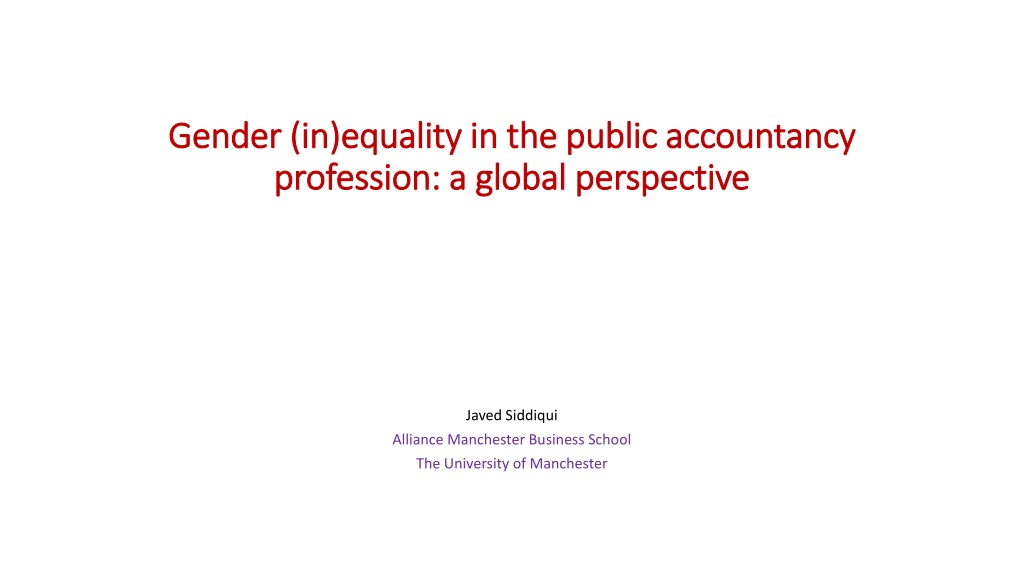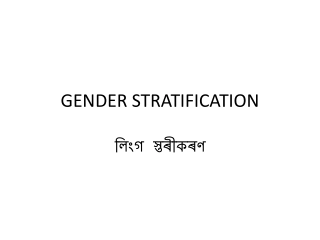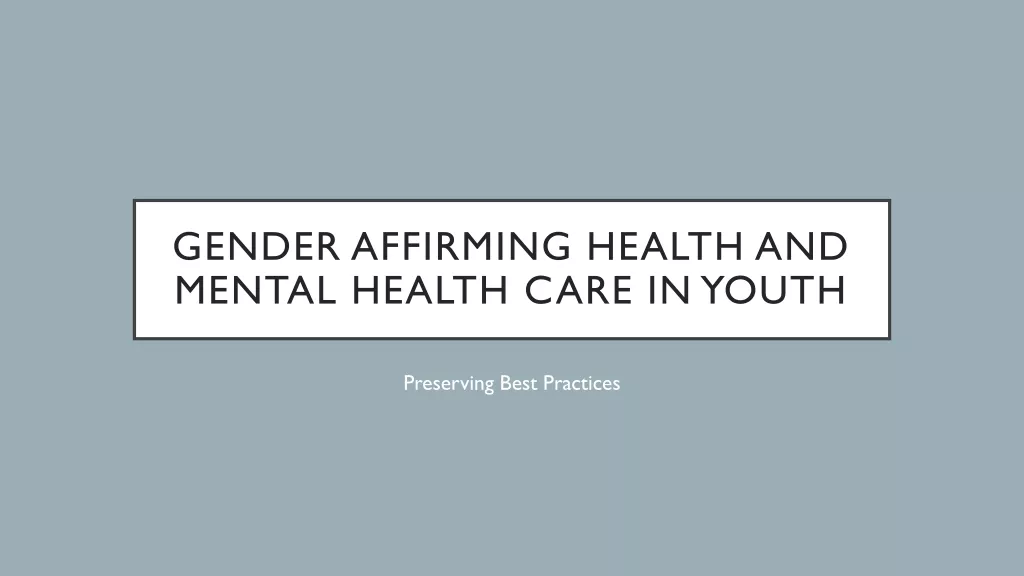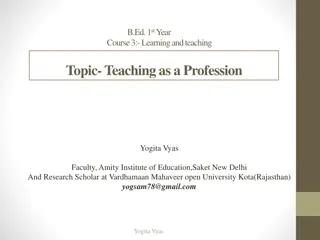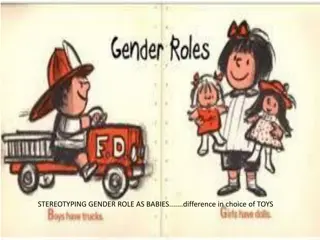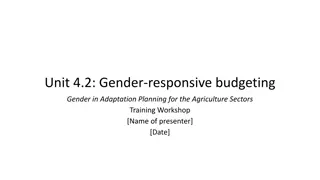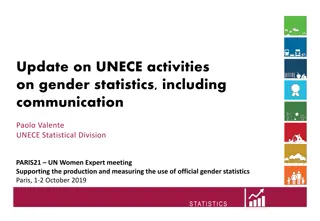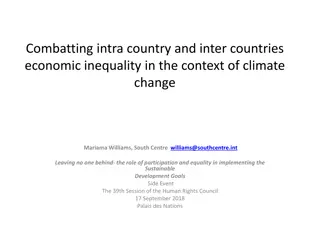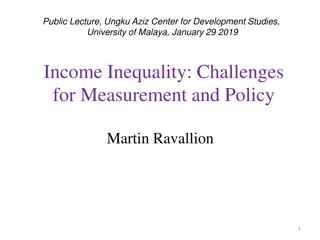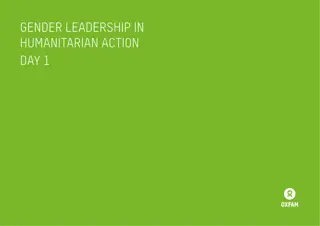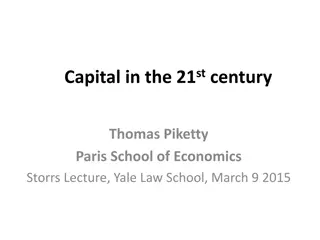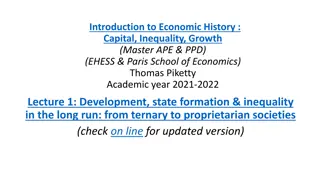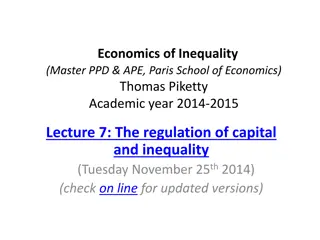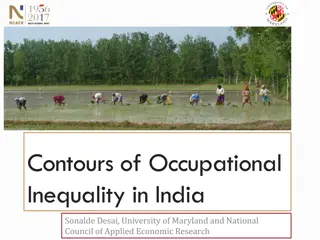Gender Inequality in the Public Accountancy Profession: A Global Perspective
The public accountancy profession sees a significant presence of women at student levels, but only a small percentage rise to partner positions. Barriers like the glass ceiling, long working hours, motherhood, and gender stereotyping hinder career progression for women in accountancy. These challenges lead to imbalances in status and pay within the sector.
Uploaded on Oct 01, 2024 | 0 Views
Download Presentation

Please find below an Image/Link to download the presentation.
The content on the website is provided AS IS for your information and personal use only. It may not be sold, licensed, or shared on other websites without obtaining consent from the author. Download presentation by click this link. If you encounter any issues during the download, it is possible that the publisher has removed the file from their server.
E N D
Presentation Transcript
Gender (in)equality in the public accountancy Gender (in)equality in the public accountancy profession: a global perspective profession: a global perspective Javed Siddiqui Alliance Manchester Business School The University of Manchester
Introduction Dominant global presence of women in the public accountancy profession 49% of students at the seven combined accountancy bodies in the UK are female. ACCA reported that 57% of its currently enrolled students are female Female students dominant in the USA And in Botswana.. Reasons why more women (than men) enter the accounting profession: locational freedom, social status, and income stability. Social status is reversed in the case of younger CPAs. (Nishiyama et al, 2014)
Introduction Yet only 17% rise to the level of partner Roughly 22% of the partners in Big 4 accounting firms are female However, in smaller firms (those with less than 200 employees), the proportion of women holding partner roles is just 11%. Within 10 to 15 years the time it takes to become a partner the near- majority of women in accounting turns into a minority (Financial Times, 2022) More women in lower paid, low status roles
Barriers for career progression within the accountancy profession The presence of a glass ceiling Long working hours The work hours in a Big Four firm are modelled after the client s program and often, in order to complete audit missions and projects, employees work 70 80 h per week; which is considerable, and not very flexible. With a job that demanding, it is difficult to find balance between work life and personal life. One must suffer. And the question is who is willing to make sacrifices?
Barriers for career progression within the accountancy profession Motherhood and family commitments Motherhood is the single most important factor why women are either excluded from the path of reaching partner or excluded themselves since they were preoccupied with other matters and work was not their main focus anymore Career break results in: Loss of clients Loss of networks
Barriers for career progression within the accountancy profession Gender stereotyping, affecting Appointments Promotions Client allocations The partners who recruited were told to be a little bit harder on women because otherwise there would have been more women in the organization than men, and that would not have been okay when they would go on maternity leaves (Anderson-Gough, 2006) Men are treated as workers, not parents; but women are always seen as mothers (Davidson and Cooper, 1992) The consequence of the double responsibility is that the career of women often takes a different turn when they have children. They temporarily leave the work environment, the time during which their male colleagues are promoted and the whole dynamic at work changes, and the whole hierarchical structure (Tudor and Faragalla, 2018)
Barriers for career progression within the accountancy profession The old boys network (male dominated networks) Networking is often synonymous with male dominance and, in many organisations, the concept of networks is understood to mean a male club or the old boys network Networks matter: informal associations between managers at all levels are at least as important as the organisation s formal policies and procedures (Brass, 1985). When women are excluded from these male networks, they may miss key components important for career success such as information, resources, support, advice, influence, power, allies, mentors, sponsors and privilege. At the higher levels of senior management and beyond, networks become increasingly important in enabling further progress. It is at this stage that women experience the greatest impediment to career advancement (Simpson and Altman, 2000). Therefore, the old boys network acts as an exclusionary device, to the detriment of female advancement, and it acts as a means of perpetuating male-dominated governance structures (Anderson-Gough et al., 2005).
Barriers for career progression within the accountancy profession Lack of visible role models and mentors In addition to providing personal and professional development advice, mentors have resources they can share The lack of female mentors and role models is perceived as a barrier. The scarcity of female mentors at higher organizational ranks and role models explicitly send a message that this profession is male dominated.
Gender issues in the public accountancy profession: the case of Bangladesh (Siddiqui, 2014) The survey results indicate that female chartered accountants perceive that gender discrimination exists within the accountancy profession. However, further sensitivity tests reveal that such perceptions appear to have significantly improved over time, as comparatively newly qualified female accountants do not appear to have similar views. Female respondents also perceive that compared to them, their male counterparts are being appreciated more in the workplace and receive significantly higher salaries. Female chartered accountants have similar work hours, and possess significantly higher career aspirations compared to male chartered accountants Both male and female respondents displayed similar personality attributes such as self- confidence, competitiveness, leadership abilities, desire for responsibility, ability to handle pressure, and work-life balance. Female respondents display significantly higher levels of commitment towards their children and family compared to male respondents. However, most female respondents also appear to hold the view that being more committed towards family responsibility is not a major obstacle towards career progression.
Gender issues in the public accountancy profession: the case of Bangladesh No significant difference in responses of male and female chartered accountants for factors such as the length of time taken to qualify as a chartered accountant, the cost involved, ICAB s examination system and the working environment within an audit firm. However females found it significantly more difficult to secure a placement in a chartered accountancy firm. Female auditors found it significantly more difficult to secure access to client personnel, and to communicate with the clients. Also, female auditors identified the working environment in client s premises as a major impediment in successfully conducting an audit. Female members of the profession have identified problems in commuting to workplace and client offices as a major struggle for them.
Other issues Glass ceiling vs class ceiling (Khan, 2022) Indian professional accountancy bodies appear to be visibly masculine The representation of women in these two websites is either weak or non- existent. Language used in these sites largely excludes women by referring predominately to the masculine as representing the norm
Conclusion and ways forward ICAB should take catalytic role in awareness building and to make more disclosures in its publications regarding gender, pay and equity in the profession. Audit firms should be encouraged to provide a more conducive environment for female students. This may include incorporating more women in senior management level positions, allowing more flexible work hours, the provision for day care centres etc. Also, a firm-wise distribution of male-female students and employees should be disclosed. From a policy level, the government can encourage more females in company management positions (such as mandatory minimum female membership in the board of directors and in other important committees such as the audit committee). With the rising number of female members in the accountancy profession, ICAB should encourage and ensure more female members in leadership roles and key decision making positions, such as in the council, and in other important committees.
Conclusion and ways forward ICAB should play a more proactive role in presenting chartered accountancy as a more female friendly profession. The institute can organise more events in different public and private universities to attract more female students to the profession. Also, regional events can be organised outside Dhaka to attract a wider female interest towards the profession. The ICAB website needs to prominently display the profiles of female icons within the profession.
